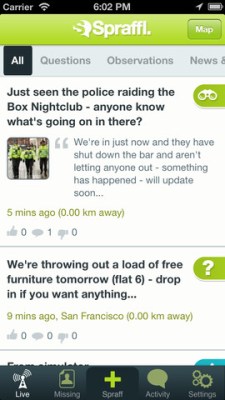Spraffl is a new iOS app that’s attempting to buck the trend of real name policy, or even semi-identifiable pseudonyms, in favour of an entirely anonymous social network, tied to a user’s location. I say social network, when in actual fact the UK startup is dubbing the app a ‘social experiment’, and in some ways the concept is reminiscent of the anarchic and experimental nature of the Internet of yesteryear. And that may be both its appeal and its ultimate downfall.
Designed as a way of sharing “hyper-local” information, such as news, gossip, reviews, or just about anything in text/photo form, everything posted to Spraffl is done so anonymously and is automatically geotagged, enabling other users to browse content by location (updates are pinned to a map). In addition, each posting is categorised, based on a number of presets, such as ‘questions’, ‘observations’, ‘news’, ‘flirt’ etc., and users can comment either publicly or in private, again anonymously.
In some ways, an anti-social, social network, there’s no friending, following or check-ins, either — the whole point of Spraffl or, specifically, its content is that it is based purely on current location, uninhibited by identity or being linked to a user’s social graph. (Though postings can be shared to Twitter and Facebook, naturally.)
Of course, there’s nothing stopping users from being more social and revealing who they are, either in public or via the private commenting feature, which is reminiscent of how we all used to operate online before Zuck’s real name policy bullied its way into to our social consciousness.
The downside of all this anonymity and the freedom it brings is that it’s also open to abuse, and that’s where Spraffl could get messy. Along with spam and the innocuous end of trolling, there’s the potential for libellous or other dubious (and illegal) behaviour. Spraffl’s solution is have the community moderate postings — if content is flagged 5 times, it’s automatically removed — and to operate a ‘three strikes and you’re out’ policy where users are banned indefinitely for abusing the community standards.
